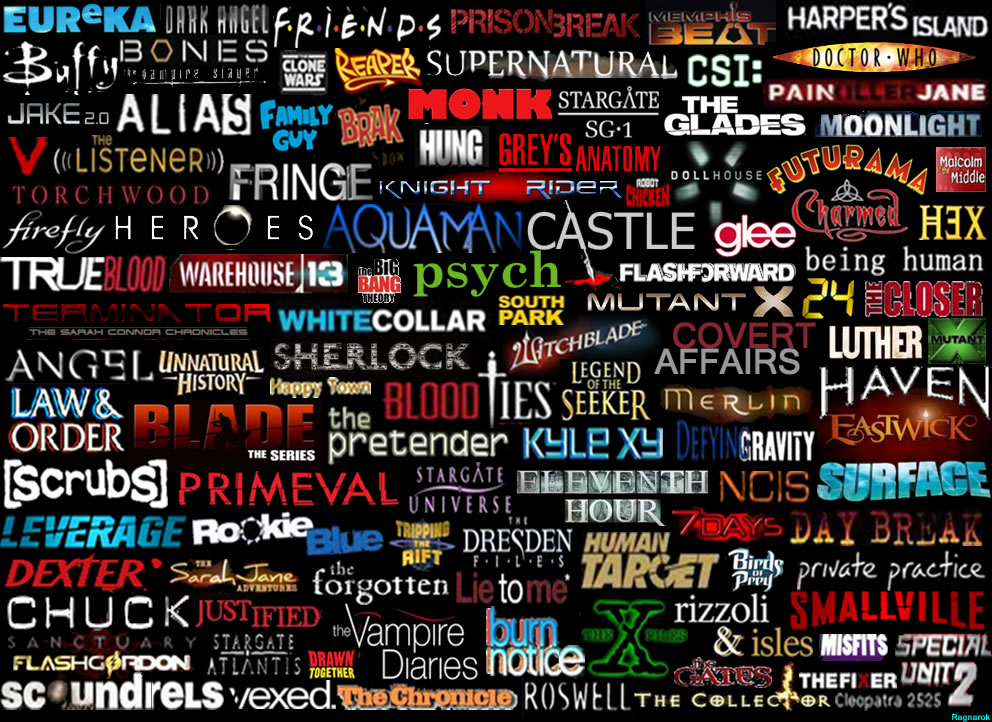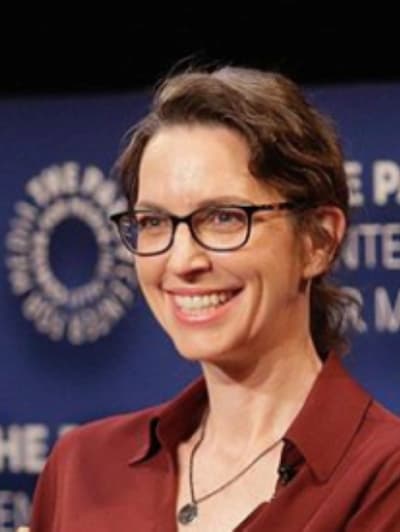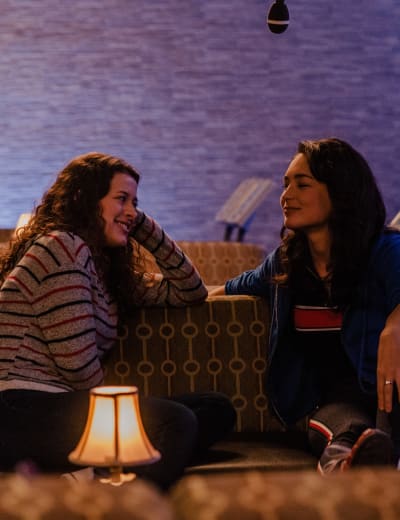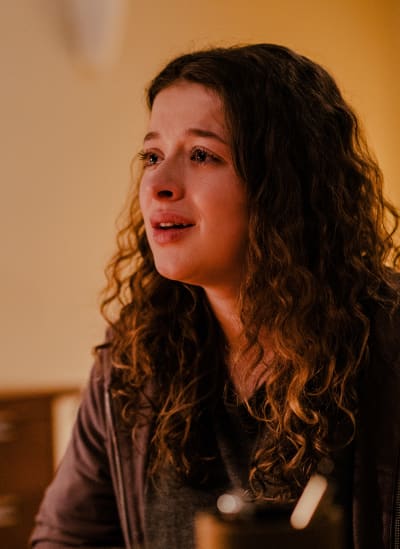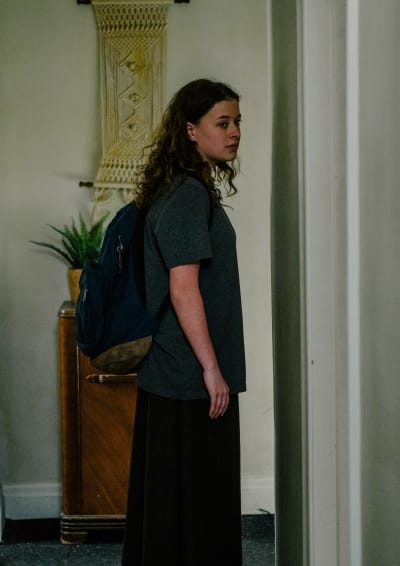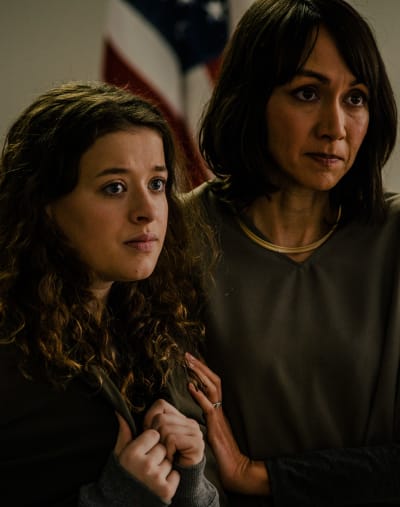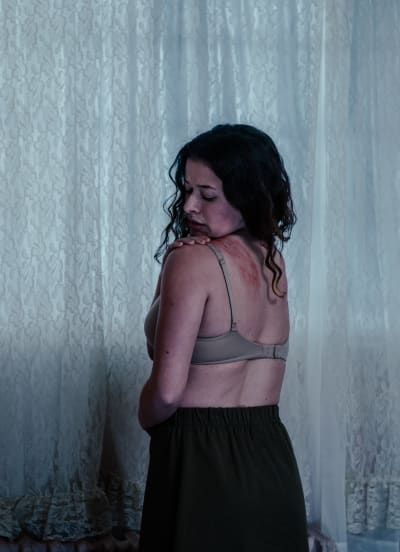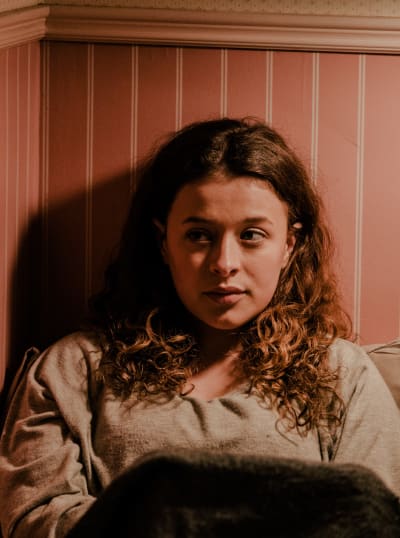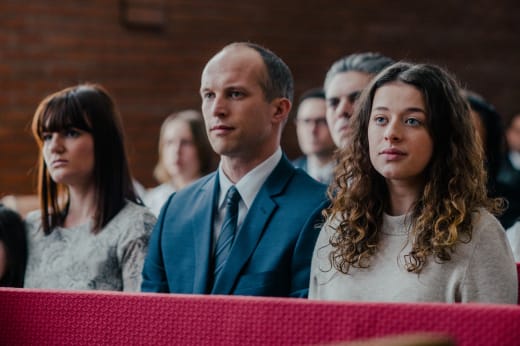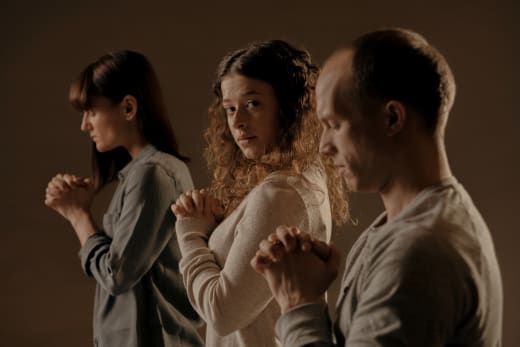Airing this Saturday, September 28 on Lifetime at 8/7c will be the true story of a teenage girl who fought her way out of gay conversion therapy.
Based on her bestseller, the Trapped: The Alex Cooper Story follows 15-year-old Alex (Addison Holley) who, after revealing that she’s gay, is forcibly removed from her home by her parents who send her to Utah under the guise of living with her grandmother.
Instead, Alex was emotionally and physically tortured for eight months at the hands of a couple in the Mormon community who promised to cure her homosexuality.
We had a chance to talk with Michelle Paradise (The Originals, Star Trek: Discovery), a ferocious advocate for LGBTQ+ rights and a former Mormon, about writing the film adaptation.
Can you tell me what made you want to get involved with the Alex Cooper story?
Yeah, well Jeff Hunt who directed the film had approached me after he read her book. Jeff grew up as a Mormon, and knew that I had been Mormon for a time in my life, and also knows that I’m gay, so he had read this book, and he said “You have to read this, and when you read it I want you to write this.”
So I read it, and I called him. I think I read it in an evening, and I called him the next book, and I said I’m in.
What was interesting about this whole process is that even at the time he knew that the rights were available, but he didn’t have them yet, so then it was a process of reaching out to Alex, and Joanna, and her collaborator and getting them on-board with us and then going from there. That’s sort of the logistics of it in terms of content.
Just reading it I was immediately touched, and moved, and horrified, and everything that you can possibly feel about Alex’s story, and I thought it was just incredible that she was so brave, and so forthcoming, with her journey, and how difficult and painful it was.
I was also deeply moved by the fact that in telling this story if you read the book, she’s so careful not to vilify her parents or the Mormon church. She has an approach to this that I found incredible, especially given what she went through. She very clearly, obviously, recognizes that none of this is a good thing.
It’s terrible what happened, and that the experience itself was just … There aren’t quite words for it. But along the way in the book she’s also very careful to point out that she knew that her parents were coming from a place of love, and genuinely believing that they needed to do something to save her soul, genuinely fearing that if they did not take steps that they would lose her for eternity.
And having been part of the religion as well, and understanding that point of view, and also now being a parent myself her perspective on all of that was just incredible in addition to the experiences that she had.
The whole thing was just … It was something that I absolutely couldn’t say no to, and we were just so grateful when Alex said that they would trust us to do it, and it did take a lot of trust to be able to leave us with that.
How close to the actual story did you get while you were writing it? Was there any input from Alex?
No. We spoke with her and Joanna early in the process. They had other people who were interested in telling her story, and they were trying to decide between different groups of people, and so Jeff and I got on the phone, and we just sort of talked to her about who we are, and how we wanted to approach this story.
I spoke to her specifically about how I would approach the adaptation. Once they gave us the rights to do that Alex steps back. We said we were happy to chat with her at any point along the way, happy to talk to her about drafts, or structure, anything like that. She made the choice to just kind of step back, and let us do our creative process.
I think you would have to ask her, but I think she really trusted what we said when we interviewed with her and Joanna originally, and I think she trusted that we would do right by her, and right by the material. I think the fact that Jeff and I both have a background as Mormons, and that I’m also gay I think probably gave her a lot of confidence.
At the end of the day, we sent her, she finally read the script once it was ready, and she’s now seen a cut of the film, and seems to appreciate all of that. I think she thinks we did a good job. I hope so.
When writing a story based on actual events how do you balance the right amount of drama for the fictionalized take so that it’s not just like verbatim of the published work?
I mean, it was a really interesting process. I recognize the strangeness of what I’m about to say, but if you read her book the first two-thirds of it really do fall into kind of a three-act film structure. There’s the time before when she’s realizing she’s gay, and falling in love with this girl.
There’s the time in conversion therapy, and then there’s the time of escape. There’s a lot in the book that comes after that with respect to the legal fight that was so important, not only to Alex but also to establish a baseline for other kids who might find themselves in that situation in Utah.
For me, it was really taking a look at that portion of the story leading up to conversion therapy, and then its immediate aftermath in being able to escape, and trying to find the moments that in terms of a film, and the visual storytelling, would hopefully best convey her experience in conversion therapy, and would best do the kind of explanations upfront that an audience who’s not familiar with conversion therapy, who’s not familiar with Mormonism, to make those elements of it accessible to viewers of the film who are watching this on Lifetime, or wherever else they may be able to see it beyond that.
So it was really a lot of, I don’t know, just kind of choosing. I had to compress some timelines. There were things that I had wanted to include in the film that we ultimately had to take out just for time because with television we were limited to about 86 minutes, and there’s only so much that you can do in that.
What you’re seeing onscreen, the one thing that did change from the book, just for the dramatic purposes of the ending, I brought the girlfriend into the end, so there was a nice bookend with the girlfriend.
In real life Alex has a different individual in her life, someone she’s been with for a few years now, so in real life, Alex has the happy ending, not with the person that she talked about in the book. I added that in, but that’s really only the large, that’s probably the largest change I made for dramatic purposes.
The rest of it is all stuff from the book, and things that Alex actually experienced, which to me is one of the most incredible things that she experienced all of that, and came out the other side, and is now able to advocate for people so that they don’t have to go through the same thing.
With your similar experience in the church, and as a gay woman, did you have ever run into anything like that growing up in your own experience?
No. I did not join the church until I was about 14, so my experience of the church was 14 until about 21. While I was in the church, I certainly am aware of the Mormon perspective on gays.
It was a little bit different back then, but still, this notion that however you’re born is how you’re born, but you can’t act on it sort of thing. It’s the action that’s the sin, and this idea of trying to change how someone feels about themselves, and telling them that how they feel about themselves is wrong.
I certainly saw some of that while I was in the church in the time that I was about to leave. I also saw quite a few people in the church who were so supportive of gay people, and who recognized that it’s not a choice, you don’t just choose to do something different.
That was, by the way, one of the things that I worked very hard to maintain in the film, and that Alex certainly infused in her book is the idea that not everyone in the Mormon church sees being gay as a bad thing.
There are folks who are wonderfully supportive and in fact some of the people in Alex’s life who ended up helping her the most are members of the Mormon church. I don’t know if that answered your question.
Yeah. Yeah, it does. And it’s hard to escape the Mormon church in Utah. I know that. You know, not escape literally, but I mean to not be around it. They’re such an influential experience out there.
What’s interesting is, I’m wondering is this story so unique not just because of the conversion therapy, but because the conversion therapy was so physical. Do you know at all if that’s how it always is?
The parents unwittingly send their kids to that not having an idea of what conversion even entails? Do you know what I mean? They’re not just getting a message. They’re being tortured.
I’ve heard various stories of conversion therapy. Some do include some sort of physical component. It’s interesting. I just finished an interview where I was interviewed alongside Alex just a little bit ago, and she said that the most difficult part for her was not the physical component, but the emotional component.
I think that’s the part of conversion therapy I would imagine that is the most painful because you are being told that something that is fundamental to who you are, the way you see yourself is wrong, and the way you see yourself should be changed. In the case of conversion therapy where religion is involved it’s also the message that God does not like you the way you are, that God will not accept you the way you are.
That was a message that Alex received repeatedly. That’s something that comes out in the film, but it’s also very much in the book.
I can’t speak from experience because I did not personally experience conversion therapy, but from what I understand just from reading Alex’s book, and hearing her in this other interview, and then some of the other research that I had done on conversion therapy, it’s that emotional and spiritual torture for lack of a better word that is all the more painful, and even in some cases more painful than whatever physical element there may be.
The other thing I want to add though is that the physical component that Alex experienced in the private home where she was supposedly receiving therapy she makes very clear in the book that’s something that the individuals who told her to wear the backpack, and stand at the wall, that’s something that they learned, at least the woman, the wife in the story, learned from her time working in a treatment center.
So there are treatment centers for conversion therapy for kids, teens, who have had struggles in the world where this is kind of par for the course, that there’s some sort of physical element to the treatment. In Alex’s case anyway that’s the physical element that they brought home and gave to her.
And so, while none of this was ever going to convert someone, and cause them to believe that they’re not gay, it’s important to remember I think that there’s an entire spectrum of how … I keep calling them kids because they are kids, but young adults, teens, are being spoken to and treated about who they are in the world.
I really hope that this film will raise awareness of that, and Alex’s book will raise awareness of that so that even if it’s something that people don’t understand that they can approach it from a different perspective.
What messages do you hope viewers take away from watching?
I hope they take away that conversion therapy specifically is incredibly harmful. If you read the book, and if you see the film, again the things in the film I did not make up. They came straight from the book. Alex became so depressed, and so hopeless, in this environment that she tried to commit suicide.
This was a 16-year-old girl who tried to commit suicide because she was put in a position to be told that everything about her was wrong. The impact to one’s self-esteem at a time when young people are already so vulnerable to messages of the world, and messages from their peers, to have that on top of it is really harmful.
Conversion therapy, in general, is so deeply harmful to young people’s psyches. I hope that people will watch this, and first of all, be aware that this is even a thing that’s out there, because I don’t think a lot of people are aware that conversion therapy even exists, or if they’re aware they don’t know what it actually means.
Certainly, this was Alex’s experience, and certainly, there are other forms of conversion therapy, but all of them involve some version of telling a young person who you are is not okay, and who you are is not good enough, and who you are is not lovable, not acceptable. Not acceptable to god or your family.
I hope people who see this will see the harm that can cause and start to look at things in a different way.
How will this experience impact your storytelling going forward?
I have to say just as a writer it’s always such a … I just feel so much gratitude to be able to work on projects that are personally meaningful and to be able to work on something like this that will make a difference.
I mean, this has hopefully the possibility of saving lives, and changing people’s perspectives not just on LGBTQ+ people but on conversion therapy as a practice. Conversion therapy is still legal. It is still in at least 38 states as I recall, and I hope I have the statistics correct. Young people can still be forced into conversion therapy by their parents.
It’s still legal in I believe all 50 states for anyone. As a practice it’s something that we definitely need to look at, and make not legal, because there’s no positive value in it.
As a writer the experience of having worked on something that is so impactful, and so personally fulfilling, has been just such a positive thing for me, and I’m so grateful for the privilege to of worked on this, and the trust that Alex placed in us to be able to make this film.
I feel like all of the projects I’ve worked on I’ve been passionate about, but to do stories like this where there’s an opportunity to bring awareness to a particular subject that I’m passionate about I look forward to doing more of that in the future, and I hope that I can.
That sounds great. Thank you so much for taking the time to talk with me, and I really hope that this has an impact on society. It was really well done. Congratulations.
Oh, good. Thank you. Thank you. I have to say I’m so proud of how it came out. I’m so honored that Alex trusted us with her story. Jeff, our director, willed this into existence, and I have to say I’m so grateful for our partners at Lifetime.
It’s an amazing opportunity to have a film like this on their network which reaches everyone in the country. And that’s I think the great thing about this is that anyone will have access to it. It doesn’t require a movie ticket.
You can turn it on, and watch it in your own home, and I hope lots of people do that.
I do hope that people who may be experiencing this in their own lives with their children, or their loved ones, or anyone they know who may be coming out, or dealing with the possibility of conversion therapy, hopefully, they will see this, and it will cause them to think twice, and start having different conversations around all of this.
Carissa Pavlica is the managing editor and a staff writer for TV Fanatic. She’s a member of the Broadcast Television Journalists Association (BTJA), enjoys mentoring writers, wine, and passionately discussing the nuances of television. Follow her on Twitter and email her here at TV Fanatic.
